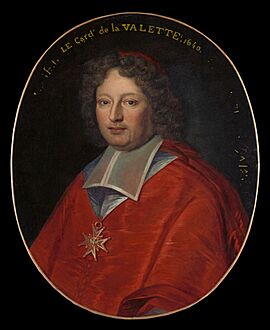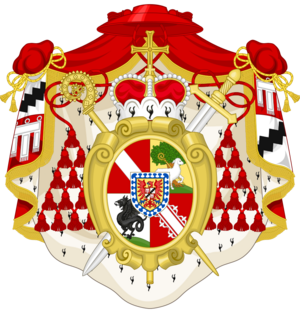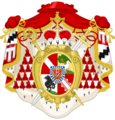Wilhelm Egon von Fürstenberg facts for kids
Quick facts for kids
Wilhelm Egon von Fürstenberg-Heiligenberg
|
|
|---|---|

Portrait of Wilhelm Egon von Fürstenberg
|
|
| Born | 2 December 1629 |
| Died | 10 April 1704 (aged 74) |
| Noble family | Fürstenberg |
| Father | Egon VIII von Fürstenberg-Heiligenberg |
| Mother | Anna Maria of Hohenzollern-Hechingen |
Wilhelm Egon von Fürstenberg-Heiligenberg (December 2, 1629 – April 10, 1704) was a German nobleman. He started as a count and later became a prince of Fürstenberg-Heiligenberg in the Holy Roman Empire. Wilhelm was also a clergyman and eventually became the bishop of Strasbourg. He played a big role in European politics after the Thirty Years' War. He worked for both the Archbishop-Elector of Cologne and Louis XIV of France at the same time. Because of his political choices, he faced serious trouble and was even arrested.
Contents
Growing Up and Studying
Wilhelm was a younger son of Egon VIII of Fürstenberg-Heiligenberg and Anna Maria of Hohenzollern-Hechingen. His father passed away in the Thirty Years' War in 1635 when Wilhelm was still young.
Starting in 1637, Wilhelm went to the Gymnasium Tricoronatum with his older brother, Franz Egon. There, they met Maximilian Heinrich of Bavaria. Their friendships from school would later help them all in their careers. Wilhelm then went to study in Louvain in 1643. After that, he studied theology in Rome in 1646. While in Rome, he met Pope Innocent X and made a good impression.
Starting His Career in Politics
In 1648, Wilhelm became a subdeacon at the cathedral in Cologne. The next year, he joined his brother Franz as a member of the Archbishop-Elector's special council. In 1650, their friend Maximilian became the Archbishop-Elector. This gave Wilhelm and Franz a lot of power in the court.
In 1651, Cardinal Mazarin stayed in Cologne for safety during a time of trouble in France called the Fronde. During his stay, he got to know Franz and Wilhelm. He saw how much influence they had in Cologne and other parts of the Empire. Mazarin started to encourage them to support French goals within the Empire. He even helped them develop alliances in the Rhineland for defense. In 1656, the Cardinal gave Wilhelm control of the Abbey of St. Michel en Thiérache.
Influencing Important Decisions
When Ferdinand III, Holy Roman Emperor, died in 1657, Mazarin asked Wilhelm to help him influence who would become the next Emperor. Mazarin even suggested Louis XIV of France for the job. Maximilian and other important electors sent Wilhelm to Ferdinand Maria, Elector of Bavaria. They wanted to see if he would agree to be the next Emperor, but he said no.
Wilhelm reported this news directly to Cardinal Mazarin and Louis XIV. He also told them that the French king did not have a good chance with the electors. At this meeting, the Cardinal started talking with Wilhelm about what rewards he and his brother would get for working for French interests. The Cardinal promised to pay them a lot of money for their dedicated work. Wilhelm wanted a written agreement to make sure the French would support him. On June 4, 1658, an agreement was signed. It said that France would support the brothers if they continued to work "for all the plans and interests of His Majesty in Germany."
After Leopold I became Emperor, Wilhelm and Franz helped a lot to create the League of the Rhine in August 1658. France supported and joined this League. It was a way to keep the new Habsburg Emperor from becoming too powerful. The Habsburgs tried to offer the brothers rewards if they stopped the League, but they refused.
International Talks and Agreements
In 1659, Cardinal Mazarin asked Maximilian and Johann Philipp von Schönborn, the Elector of Mainz, to help end the Franco-Spanish War. Maximilian then sent Wilhelm often to the French court. Wilhelm was involved in the talks and the signing of the Treaty of the Pyrenees.
In 1661, Wilhelm spent months in Paris. He was trying to arrange a marriage for Charles IV, Duke of Lorraine with Anne Marie Louise d'Orléans, Duchess of Montpensier. She said no to the marriage, but she liked spending time with Wilhelm. She admired how smart he was and how much he knew about other countries.
In 1664, Emperor Leopold made Fürstenberg-Heiligenberg a principality instead of just a county. He also gave the title of Prince to Franz and Wilhelm. This was done to try and bring the brothers closer to Habsburg Austria. However, it did not seem to change much. As the representative from Cologne, Wilhelm led talks in 1665 and 1666. These talks aimed to end the involvement of Bernhard von Galen, the Bishop of Münster, in the Second Anglo-Dutch War.
When Philip IV of Spain died in 1665, powerful countries wondered how long his heir, the sickly Charles II, would live. France asked Wilhelm to start talks about who would take over in Spain and the Spanish Netherlands. Before the War of Devolution, Wilhelm carried money to Maximilian. This money was to help Cologne build up an army. He also visited other rulers to convince them not to let Austrian forces move through their lands. This would stop them from opposing French actions in the Netherlands.
On January 8, 1667, Wilhelm went to Vienna. He represented Cologne but was secretly working for France. He wanted to find out how the Emperor felt about the Spanish succession. He spent a lot of time making connections with different officials there. He was offered titles and money to join the Habsburg side. This would mean working to end the League of the Rhine, but he said no. He also learned about Hungarian revolutionaries who wanted French help. Wilhelm told Louis XIV about them. He thought they could distract Austrian forces. This led to a treaty in 1668 between France and Austria. They agreed that if Charles died without an heir, France would get certain Spanish territories. The remaining Spanish lands would go to Austria.
In early 1668, Wilhelm was talking with Grand Pensionary Johan de Witt. They tried to make a deal in the War of Devolution. The idea was to divide the Spanish Netherlands between France and the Dutch Republic.
In early 1669, Wilhelm spent a month training with his French army unit in Lille. He had been made a colonel of this unit shortly before. This made it even harder for people to believe he wasn't working directly for Louis XIV. However, Wilhelm also used the French for his own benefit. That July, he had his brother, Hermann Egon, arrange a meeting. It was made to look like the Dutch were negotiating trade deals with the League of the Rhine against France. This was done so the French would give the brothers money. They then used this money to buy Mainau.
Wilhelm was very important in getting ready for the Franco-Dutch War. He traveled between France and many rulers in the Empire. He tried to build a strong alliance for the attack on the Dutch. In 1670, he got French support for Cologne's army. He made sure Maximilian's interests were protected in the treaty. He then tried to convince Frederick William, Elector of Brandenburg, to join the French alliance, but he was not successful. By July 1671, Wilhelm convinced the Bishop of Münster to join the French alliance.
Facing Challenges and Release
During talks in 1666, Wilhelm was opposed by the Elector of Brandenburg. In 1670, while trying to get Brandenburg to join the French alliance, Wilhelm also asked about a possible successor for Emperor Leopold I. Wilhelm again suggested Louis XIV as the next Emperor. However, Brandenburg preferred another candidate.
When Wilhelm was leaving, some of his bags disappeared. They contained his money and important diplomatic papers. The bags were found the next day, but the money was gone. Wilhelm thought it was just a theft. He did not realize his papers had been searched. A document about his discussions for the Emperor's replacement was missing. This document would later be used against him. In 1671, the Elector of Brandenburg often spoke to Leopold against Wilhelm's influence. The Emperor became more strongly against Wilhelm's work.
In 1672, the Emperor joined the Franco-Dutch War as an ally of the Dutch. This meant he was against several bishops in the northwest Empire. The Fürstenberg brothers were seen as a main reason for this situation. On February 14, 1674, Wilhelm was arrested by imperial cavalry in Cologne. At the time, he was earning a lot of money from France. He was quickly taken to Vienna and faced serious charges. He was saved by the help of the Pope's representative in Cologne. However, he was kept in prison until the Treaty of Nijmwegen was signed in 1679.
As a reward for his work, Louis XIV made him bishop of Strassburg in 1682. In 1686, Louis XIV got Pope Innocent XI to make Wilhelm a cardinal. In 1688, Louis XIV helped him get elected as coadjutor-archbishop of Cologne. This meant he would be Maximilian's successor. However, the Emperor and the Pope stopped this on August 26, 1688. Louis XIV then attacked the Empire. He used this action and his sister-in-law's claim to the Palatinate as reasons for the attack. As the French forces faced difficulties in the Nine Years War, Wilhelm Egon moved to France. He retired to his abbey of St-Germain-des-Prés near Paris. He passed away there on April 10, 1704.
Images for kids
 | Percy Lavon Julian |
 | Katherine Johnson |
 | George Washington Carver |
 | Annie Easley |




